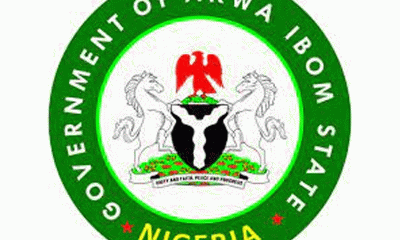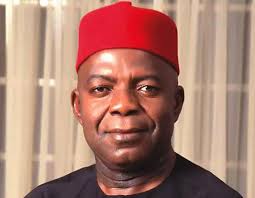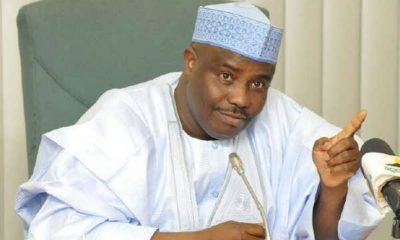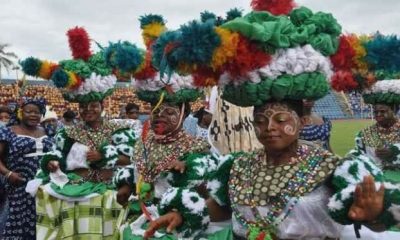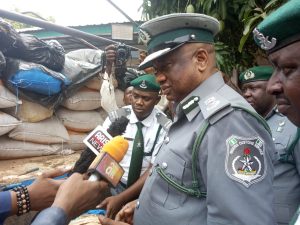Education
Must Every State Own a University?
By Obike Ukoh
Rivers, Enugu, Imo and Edo states took the lead in the establishment of state universities.
The Rivers State University of Science and Technology was established in 1980, the same year the old Anambra State established Anambra State University of Science and Technology (now Enugu State University of Technology).
Imo State University, Okigwe (now Abia State University, Uturu) was established by the old Imo State in 1981, the same year old Bendel State established Bendel State University (now Ambrose Alli University, Ekpoma).
All the universities were established during the Second Republic. The pioneers in the establishment of state universities were states with high students’ enrolment, seeking admissions into higher institutions.
As a result of quota system, bright and qualified students from these states were denied admission, the raison d’être for the states to establish their own universities to accommodate qualified indigenes.
That was then. Many states it appears, now establish universities for sake of it, not out of necessity. There is now a rat race by states to establish own universities, even some states establishing two.
Not long ago, Adamawa State University, Mubi, complained of low patronage by indigenes.
Prof. Kaletapwa Farauta, the Vice-Chancellor of the Adamawa State University, who spoke recently, expressed worry over the low number of indigenes applying for admission into the university.
“Children from our Local Government Areas (LGAs) do not apply to the state university even though they are indigenes of the state.
“It will be good to let our people know that every LGA has a certain number of slots for admission into the state university. This is because they are the major stakeholders.
“But in many occasions after admissions, we found out that so many LGAs did not fill their slots.
“They let go off their slots because they don’t have candidates to fill up the gaps,” she said.
According to her, the development is a source of concern to the management of the university.
Farauta said that it was imperative for the indigenes to recognise themselves as the university’s major stakeholders, and urged them to ensure that they fill their admission quotas.
She enjoined the state and local education authorities to begin to sensitise their students to always choose their state owned university when filling their Joint Admission and Matriculation Board (JAMB) forms.
Academic Staff Union of Universities (ASUU)’s opposition to proliferation of state universities is predicated on poor funding, among others.
President of ASUU, Emmanuel Osodeke said that some universities are established by states, based on political, rather than educational and logistical considerations.
Osodeke said that some state chief executives regard universities as, “constituency projects. ”
To check the arbitrary creation of universities, Osodeke suggested that the NUC should play a more visible role prior to the establishment of universities by state and federal governments.
“I should not be mistaken as saying that the NUC should only be more stringent in its accreditation of courses offered by these government-sponsored universities.
“Certainly, the NUC must have increased direct involvement before the establishment of new universities.
“Undoubtedly, the revival of the educational sector is paramount to the progress of this country.
“If, however, government accords more priority to the creation of more universities than the funding and maintenance of the existing ones, such will be counterproductive and inimical to the progression of our society,” he said.
Calabar Zone of ASUU, on its part, expressed disappointment at the way and manner some state governments establish state universities without backing same with necessary laws, and urged governors to stop playing politics with universities establishment.
The Zonal Chairman, Dr Aniekan Brown, said the development portend dangers as most governors use that to interfere with the autonomy of state universities.
“The non-demonetisation of the Act gives room for university administrators and governors to trample on the autonomy of the universities by usurping the powers of governing councils and senate.
“Evidence of this could be gleaned from the manipulation of the composition or non-constitution of governing councils.
Brown called on all concerned to immediately set in motion necessary steps for domestication of the Universities Miscellaneous Provision Amendment Act to allow for exercise of autonomy in the state universities in line with the national and global best standards.
He identified another area of concern to ASUU to include funding of state universities, adding that the union has observed that most state government now rely on TETFUND and sometimes divert such money to establish their universities.
“In some instances, state governments divert allocation meant for existing institutions from TETFUND to establish their politically motivated universities.
“The inadequacy or absence of funding for capital projects has overtly manifested in the dearth of well-equipped workshop, libraries, studios, classrooms, hostels, utilities and municipal services.
“ASUU is committed to working for industrial harmony in all universities including those owned by state governments.
“However, this commitment can only be sustained if the respective visitors and governing councils take urgent steps to address the nagging issues highlighted so far.
“Therefore, we call on all owners of state universities to as a matter of urgency, make adequate budgetary provision for both capital and recurrent expenditure for infrastructure, staff development and payment of staff emoluments,” Brown stressed.
Edo inherited the Bendel State University, built by old Bendel State Government. But in 2016, the then Edo governor, Adams Oshiomhole, built Edo State University, Uzairue, located in his country home.
The government also attempted to convert the state’s College of Education into a University of Education.
But his successor, Gov. Godwin Obaseki, said that the move by the previous administration to convert the old College of Education into a University of Education was not feasible due to budget constraints.
He added that the state was already blessed with two state-owned universities and seven private universities, saying that it would be imprudent to establish another state-owned university.
From Delta the story was different as the Delta Government recently inaugurated the governing councils of the three new universities at Government House, Asaba.
The three universities are: University of Delta, Agbor; Dennis Osadebey University, Asaba and the Delta State University of Science and Technology, Ozoro.
Gov. Ifeanyi Okowa, who inaugurated the councils described as false, ASUU allegations on the proliferation of universities in the state.
Okowa stressed that the universities were established to increase access to educational facilities for the teeming number of students from the state.
“Let me respectfully disagree with the position of ASUU that there is an unhealthy proliferation of state universities in the country.
“The establishment of universities is on the concurrent list and, as a state, we do so when the need arises.
“In our case, it is to fill the gap created by shortage of space and to increase access to university education for our qualified youths.”
The governor, who relied on statistics from the Joint Admission Matriculation Board (JAMB) 2018 report, said that 80,131 or 4.85 per cent of the total number of Unified Tertiary Matriculation Examination (UTME) candidates for that year were from the state.
“Also, for the 2019/2020 academic session, 25,896 candidates from the state chose Delta State University (DELSU) as first choice. Out of this number, 22,358 qualified but only 4,854 candidates could be admitted.
“From the foregoing, you can see that even the state-owned DELSU has reached its full carrying capacity, hence, it is incumbent on us as an administration to broaden access to university education for our bright students especially in the fields of medicine, engineering, law, ICT and architecture.”
Okowa did not speak on constraints of funding, the bane of Nigerian universities.
Stakeholders, however insist that though access to university education is desirable, establishment of universities, especially by states should be driven by patriotic consideration not political expediency.
They also say that expanding of infrastructure, may be a better alternative to boost admissions openings.
Obike Ukoh is of the News Agency of Nigeria (NAN)
Education
TETFund Trains 1,000 Students, 15 Staff in Bauchi Varsity
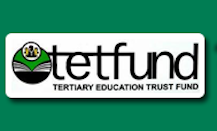
The Tertiary Education Trust Fund (TETFund) on Monday trained 1,000 students and 15 staff members of Sa’adu Zungur University (SAZU), Bauchi, on career development.
Vice Chancellor of the university, Prof. Fatimah Tahir said that the training reflected the institution’s commitment to preparing students for both academic achievement and professional excellence.
The training had the theme: “Empowering Future Professionals: Mastering Career Tools, Building Networks, and Navigating Opportunities.
’’Tahir said that the workshop focused on building the capacity of nominated Faculty Career Officers and dedicated staff who would serve as faculty anchors for future career programmes.
She commended TETFund for supporting the establishment of the university’s Career Service Centre, saying its intervention was transformational in creating sustainable structures for students and alumni career support.
Also speaking, Dr Wasilu Suleman, Director of Human Resource and Career Development, SAZU, described the initiative as a turning point, which placed career development at the heart of academic excellence.
He emphasised their critical role as mentors, facilitators, connectors, and enablers, in helping students discover purpose, build competence, and compete in the modern labour market.
During the sessions, facilitators guided participants on resume and cover letter writing, internship and volunteer placements, mock interviews, and negotiation strategies.
One of the participants, Malam Adamu Ibrahim, said they were expected to be better equipped to navigate career opportunities, strengthen professional networks, and bridge the gap between academic learning and workplace demands.
| ReplyReply allForwardAdd reaction |
Education
Stakeholders Blame Exams Body, Parents over Mass Failure

Stakeholders in the education sector said, the mass failure in the 2025 West Africa Senior Secondary Certificate Examinations (WASSCE) stem from systemic issues attributed to the examination body, parents and the students
The stakeholders spoke in separate interviews in Abuja on Thursday.
Founder, Exam Ethics Marshall International (EEMI), Ike Onyekere faulted the systemic malpractice and deep-rooted corruption within Nigeria’s examination ecosystem.
The West Africa Examination Council (WAEC) had revealed a sharp decline in performance in the 2025 SSE results compared to the previous year.
Out of a total of 1,969,313 candidates who sat for the examination across 23,554 schools, only 754,545 candidates, representing 38.
32 per cent obtained a minimum of five credits, including English Language and Mathematics.Onyechere decried the 38.32 per cent credit pass rate recorded in this year’s examinations as a “very poor result,”
He, however, noted that the decline was not unexpected due to challenges encountered during the exams.
According to him, there were serious logistical issues during the exams such as power outages, poor supervision, and lack of proper oversight which contributed to students’ poor showing.
“I am not surprised because these logistical issues, as critical as they were, they were ignored during and after the exams.
“No person talked about how those kinds of issues should be addressed in terms of how they affected the performance of those students.
“No person talked about what happened after their papers were collected from them, when they did finish their allotted time and when there was no light.
“So these are some of the questions we need to address,” he said.
Onyechere further criticised students’ growing reliance on “magic centres” and malpractice rings, arguing that many students no longer prepare sincerely for their examinations.
He said most of the students have their mind fixed on magic centres, and other forms of malpractices unfettered and with no consequences.
He accused WAEC and its sister examination body of enabling malpractice by repeatedly failing to name and shame individuals and institutions complicit in exam fraud.
“Every year, WAEC releases statements saying schools were involved in malpractices but where are the names? Who are these schools? Who are the supervisors?
“They recycle these supervisors and protect them,” he said
Citing his experience in the Federal Ministry of Education, he alleged that past attempts to publish and blacklist indicted schools and individuals were stifled.
He praised the Joint Admissions and Matriculation Board (JAMB) for its comparative transparency, saying, “at least, JAMB names CBT centres and schools caught in malpractice and takes them to court.
Onyechere admonished WAEC to take cue from JAMB, in addressing the menace of malpractices.
For meaningful change, he called on WAEC to publish names, sanction schools, blacklist corrupt officials, and take concrete action, not just about release of statements.
He also advised students to reject malpractice, rather, discover and develop their true talents.
Also, Dr Jekayinfa Olatunji, a Fellow with the National Mathematical Centre (NMC), called for a national education emergency roundtable, reforms in exam preparation strategies, and closer monitoring of learning standards at all levels.
Olatunji said until tangible solutions are implemented, the futures of millions of Nigerian students would hang in the balance.
“In 2024, no fewer than 1,805,216 students sat for waec exams out of which 1,332,089 students passed at least 5 subjects including English Language and Mathematics at credit level and above, representing 72.12 per cent pass.
“Ordinarily, the results may seem good, but, what about the remaining 27.88 per cent who didn’t get five credits with English Language and Mathematics?
“The students might not have progressed in their education that year.
“Now, the worst has happened in 2025. Out of 1,969,313 students who sat for WASSCE exams, only 38.32 per cent passed five subjects including English Language and Mathematics.
“The remaining 68.68 per cent didn’t pass five subjects including English Language and Mathematics.
“What this means is that only 754,641 students out of 1,969,313 succeeded in having scores that could earn them tertiary institution admissions,” he said
He advised the education stakeholders to take proactive steps to forestall a repeat of the woeful performance in 2026.
Similarly, a civil servant and a parent, Ijeoma Osita, attributed the poor performance in the examination to both students’ attitudes and the role of parents in fostering academic irresponsibility.
Osita decried increasing culture of academic laziness among students and misplaced priorities by parents.
She further lamented that the quality of learning was fast diminishing due to an over-dependence on technology without critical thinking and originality.
According to her, many students no longer commit themselves to studying or building academic discipline, choosing instead to rely heavily on shortcuts such as Artificial Intelligence (AI), examination malpractice, and plagiarism.
“From what I have observed, many students are not ready to go the extra mile to study, build their capacity and equip themselves academically.
“They rely so much on AI and ‘expo’. Unfortunately parents endorse the negative trend, in having their children pass exams.
“They fail to harness the potential in their children by encouraging them to study harder, or even employ extra hands to coach them in the areas of weakness.
“The parents prefer to hire “machinery,” sometimes to write exams for their children.
“Some will even encourage and finance their children to leave the school, where they have attended for years, to register them in ‘miracle centres’,” she said.
She urged parents to take more responsibility in guiding their children, stressing the importance of discipline, hard work and quality education over superficial success.
| ReplyForwardAdd reaction |
Education
WAEC, Education Ministry Resolve Result Glitch Updates Ready in 24 Hours

By Elijah Oguche, Abuja
The Federal Ministry of Education has announced the resolution of a technical issue affecting the 2025 West Africa Senior Secondary Certificate Examinations results.
The issue occurred during post-release processing in subjects where paper serialisation was implemented as part of WAEC’s exam security measures.
A statement by Folasade Boriowo, the director of press of the ministry on Thursday said the Ministry commended the West African Examinations Council for its swift response, transparency, and professionalism in resolving the glitch.
Updated results will be accessible via the result checker portal within the next 24 hours.The Ministry also appreciated the patience of affected candidates and assured the public of its continued pursuit of fairness and credibility in assessment processes.
“This development reinforces the Honourable Minister’s broader education reform agenda, which prioritizes examination integrity across all bodies under the Ministry’s supervision, particularly WAEC and the National Examinations Council (NECO). In line with this, both bodies are set to commence a phased rollout of Computer-Based Testing beginning with objective components in November 2026.
“The adoption of CBT represents a critical step toward curbing malpractice, preventing question leakages, and restoring public trust in the examination system. It is a necessary reform to ensure Nigerian students are assessed strictly on merit and that their certificates retain credibility both locally and internationally.
“Dr. Alausa emphasized that safeguarding the integrity of examinations is not optional—it is essential. Upholding high standards, he noted, protects the future of our young people and sustains Nigeria’s global reputation,” Boriowo stated.


